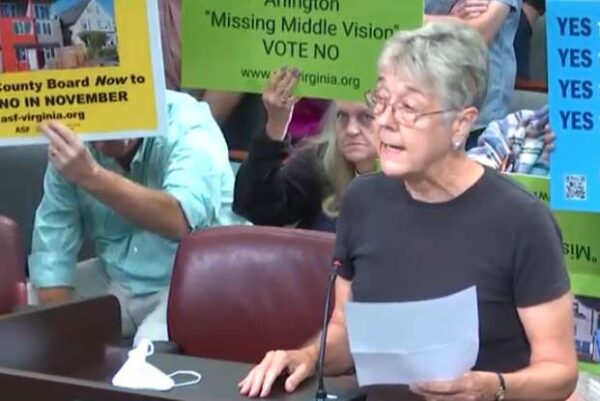
In a crowded Bozman Government Center on Saturday morning, one person urged the Arlington County Board to move forward with Missing Middle housing while another critiqued the push for county-wide zoning changes.
But Board members had only to read the room — and the signs people brought — to see a sea of residents who were as divided into pro- and anti-Missing Middle camps that day as they were during a raucous meeting this June.
“We owe it to our larger community to let more people live here through smaller multiplexes, yes, but especially through denser affordable apartment housing. Doing otherwise is environmentally unsustainable — and it’s exclusionary,” said Susan English. “I’ve lived in a pleasant tear-down in a nice neighborhood for 40 years, but I hope when I leave my house will be replaced with at least a duplex.”
Independent County Board candidate Audrey Clement, the only candidate opposed to the Missing Middle upzoning proposal, told those attending and watching the meeting that she would “debunk some myths about it.”
Reciting excerpts of a speech she has presented during the Arlington County Civic Federation and Chamber of Commerce candidate fora, Clement argued that Missing Middle will not add to the county’s stock of 3-bedroom, and will reduce Arlington’s tree canopy, and will not increase home-buying opportunities for people of color — though the latter is an assertion with which the local NAACP disagrees.
Clement suggested alternatives such as office-to-residential conversions.
Board Chair Katie Cristol broke through the whooping and hollering that followed Clement’s comments, saying, “Alright, thank you ladies and gentlemen, we’re going to continue hearing from neighbors.”
But she later thanked attendees for respecting the rules for addressing the Board, which include restrictions on how many people can speak on a given matter not otherwise on the Board’s agenda.
“I also just want to give a sincere thanks to all who’ve come who respected our one-speaker-per-topic rule, helping us hear from more neighbors,” she said.
During the June meeting, some attendees shouted at Cristol when she cut off another speaker for violating the rule. The Board allows one speaker per topic, with opposing views on the same topic considered two separate topics.
Booing, which followed a speech this summer by a member of pro-density group YIMBYs of Northern Virginia, was also absent this time around. But there was plenty of applause — for every speaker, despite the range of topics, from the taxes nonprofits pay to climate change.
Resident Dima Hakura, who has spoken at length in meetings and with the Board about the Courthouse West General Land Use Plan, took the podium to urge the County Board to listen to its constituents, not “patronize us.” The room erupted in cheers after she finished her speech.
We need a leadership that builds consensus among us and unites us. A leadership that not only respects our opinions and values them, but also taps into them. One that considers our thoughts and makes constructive use of them to evolve the solutions possible… Interestingly, Arlington was always known for that, but somehow, somewhere we lost our way and we need to find it again.
… When I told people I was coming to speak before you today, the reaction was: “Why bother?” or, “It’s not going to make an iota of difference,” or, “Their mind is already made up. They have an agenda they want to push.” Regardless, I am hoping differently.
Public comment wrapped up on more benign topics — the return of Clarendon Day among them — but Hakura’s speech prompted a few off-the-cuff responses.
County Board Vice-Chair Christian Dorsey told Hakura that she “brought up really an essential tension that’s existing in Arlington right now and I appreciate and believe you are quite sincere in having our community move forward on big issues with consensus.”
He continued:
But I will also note, as a realist, that’s difficult — as reflected by the various signage that we have in the room — when, on some of the major issues in our community, the perspectives are “Yes,” or “No.” “Save,” “Destroy.” It’s tough to build consensus when the extremes are so rigid in terms of what it is they want. I don’t say that to criticize. It’s just reality.
In order to have consensus, you actually have to have people who are going to come together and agree on a certain set of values, and when it comes to issues like growth and development in Arlington, we’re just not there. I say that again, not to criticize, it’s just where we are. So what we desire may not be possible until some things fundamentally change.
Dorsey and fellow Board member Libby Garvey also cautioned against looking too fondly on the history of the “Arlington Way,” or the pathways residents have to influence policy-making.
Board member Libby Garvey adds that prior eras had less consensus in Arlington than the rose-tinted memories might suggest. Also notes contrast between folks advocating for low-income renters and folks living in multi-million dollar homes advocating for themselves.
— Luca Gattoni-Celli (@TheGattoniCelli) September 17, 2022
Garvey tied respect for County Board’s rule for speaking to the situation Arlington is in today.
“I also appreciate everybody following the one-speaker-per-item rule and helping to keep the conversation going forward,” she said. “It’s the only way we’re going to work this out with the extreme diversity and changes we have. This is a great community, and we’re going to work together to keep it that way.”
The county has a number of upcoming Missing Middle engagement opportunities, including community conversations and information sessions through the end of October.

